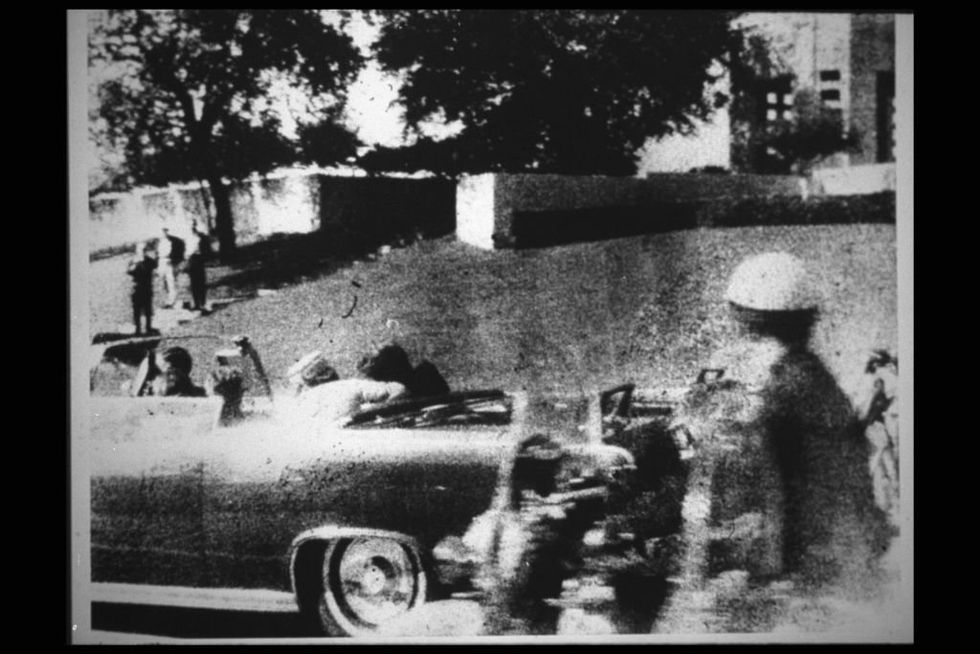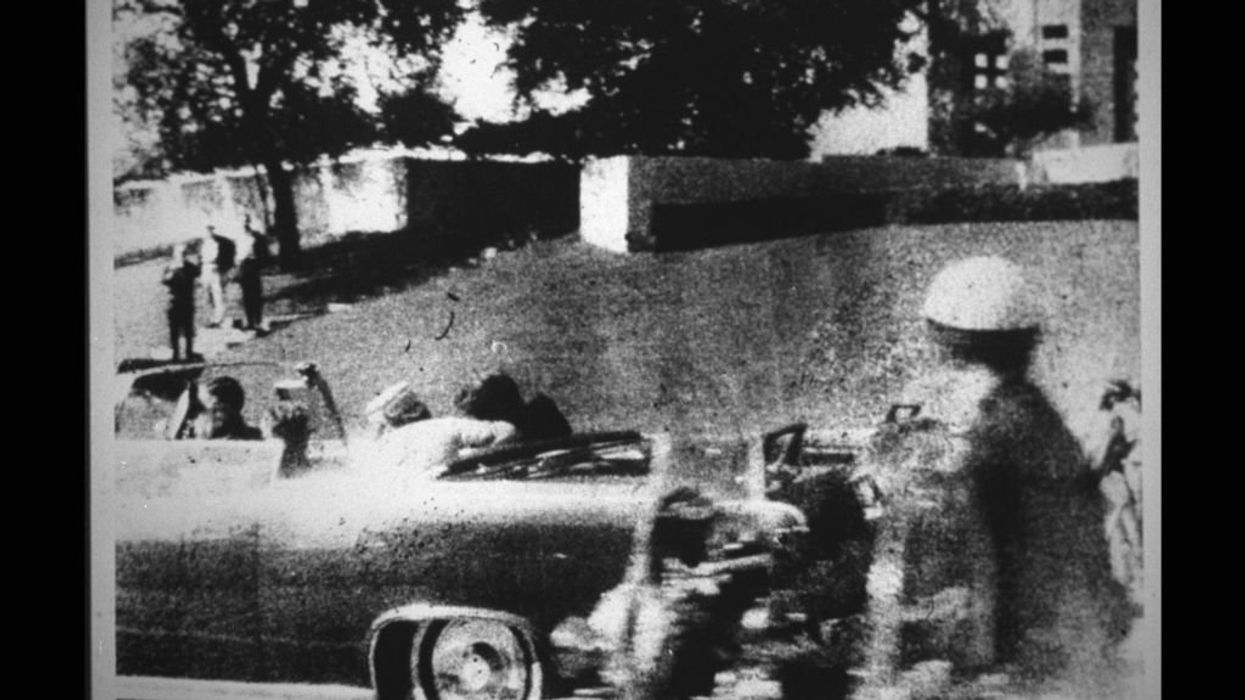61 years later, JFK assassination records remain hidden — and Biden is to blame
Just days before the anniversary of John F. Kennedy’s assassination on Nov. 23, 1963, Americans are no closer to knowing the whole truth about what happened at Dealey Plaza in Dallas that day. In fact, the Biden administration is taking steps to ensure that the truth may never be known. On Friday, Oct. 18, Joe Biden’s Justice Department took further action to block the release of secret records related to the assassination. The government filed a summary judgment motion to assert control over congressional records related to JFK’s murder. This marks the latest effort by the Biden administration, which has moved since 2021 to prevent the release of remaining assassination documents held by the National Archives and Records Administration. Each time the government attempts to conceal or restrict critical information about the assassination, it sparks a massive and visceral public reaction. The Justice Department’s moves contradict the 1992 John F. Kennedy Assassination Records Collection Act, which explicitly prohibits the president from exercising authority over congressional and non-executive branch records. The JFK Records Act also mandated the full public disclosure of all assassination records by Oct. 26, 2017. On Oct. 19, 2022, the nonprofit Mary Ferrell Foundation, a privately operated archive specializing in records related to the Kennedy assassination and other major events of the 1960s and 1970s, filed a lawsuit against Biden and the National Archives. The lawsuit demands the release of all assassination records in compliance with the 2017 statutory deadline. The suit also seeks court orders requiring the National Archives to maintain a complete public directory of assassination record identification forms and fulfill other responsibilities mandated by law. The idea for the lawsuit emerged after two successive presidential administrations missed the deadline to release all assassination records. However, it was President Biden’s actions after 2021 that triggered the lawsuit. Biden’s decisions effectively dismantled the standards set by the JFK Records Act, allowing executive agencies like the CIA, FBI, and Secret Service to withhold records. These agencies, which have long resisted releasing assassination documents, have even admitted to destroying some of the records. The Justice Department’s motion for summary judgment would undermine the intent of the JFK Records Act. The law aimed to strip executive agencies of their authority over assassination records and establish an accountable, enforceable process for reviewing and releasing these documents. From 1994 to 1998, the Assassination Records Review Board, an independent agency established under the law, issued legally binding orders to review, postpone, or release millions of documents. These decisions ensured that postponements adhered strictly to the limited criteria outlined in section 6 of the law. The Justice Department’s attempt to assert presidential control over congressional records is especially baffling. Multiple sections of the JFK Records Act explicitly state that the president’s authority applies only to executive branch records. Section 9(d)(1) clearly limits presidential power, underscoring that it does not extend to congressional assassination records. Section 7(l) of the JFK Records Act explicitly states that the House and Senate Oversight Committees retain ongoing control and oversight over the management of assassination records, even after the ARRB concluded its work. When Congress passed the JFK Records Act 32 years ago, lawmakers expressed deep concerns that executive branch agencies, with their history of obstructing investigations into the assassination, would continue to block the release of records. The Senate unanimously ratified the Act and filed a report emphasizing its intent, providing an interpretive guide for courts to refer to in cases involving the Act. The Senate’s apprehension about presidential control over congressional records leaves no room for misinterpretation. Since Kennedy’s assassination 61 years ago, federal agencies have aggressively collected and locked away documents and evidence related to his murder. Each time the government attempts to conceal or restrict critical information about the assassination, it sparks a massive and visceral public reaction. This occurred when the infamous Zapruder film was first broadcast in 1975, 12 years after the assassination, and again after Oliver Stone’s Academy Award-winning 1991 film brought public attention to the government’s secret troves of JFK assassination records. “The JFK Assassination Chokeholds” chronicles over 60 years of government obstruction surrounding the Kennedy assassination. It details how recent presidential orders have effectively sealed thousands of records from public disclosure, directly violating the unanimous will of Congress and the expressed desires of the American people.


Just days before the anniversary of John F. Kennedy’s assassination on Nov. 23, 1963, Americans are no closer to knowing the whole truth about what happened at Dealey Plaza in Dallas that day. In fact, the Biden administration is taking steps to ensure that the truth may never be known.
On Friday, Oct. 18, Joe Biden’s Justice Department took further action to block the release of secret records related to the assassination. The government filed a summary judgment motion to assert control over congressional records related to JFK’s murder. This marks the latest effort by the Biden administration, which has moved since 2021 to prevent the release of remaining assassination documents held by the National Archives and Records Administration.
Each time the government attempts to conceal or restrict critical information about the assassination, it sparks a massive and visceral public reaction.
The Justice Department’s moves contradict the 1992 John F. Kennedy Assassination Records Collection Act, which explicitly prohibits the president from exercising authority over congressional and non-executive branch records. The JFK Records Act also mandated the full public disclosure of all assassination records by Oct. 26, 2017.
On Oct. 19, 2022, the nonprofit Mary Ferrell Foundation, a privately operated archive specializing in records related to the Kennedy assassination and other major events of the 1960s and 1970s, filed a lawsuit against Biden and the National Archives. The lawsuit demands the release of all assassination records in compliance with the 2017 statutory deadline. The suit also seeks court orders requiring the National Archives to maintain a complete public directory of assassination record identification forms and fulfill other responsibilities mandated by law.
The idea for the lawsuit emerged after two successive presidential administrations missed the deadline to release all assassination records. However, it was President Biden’s actions after 2021 that triggered the lawsuit. Biden’s decisions effectively dismantled the standards set by the JFK Records Act, allowing executive agencies like the CIA, FBI, and Secret Service to withhold records. These agencies, which have long resisted releasing assassination documents, have even admitted to destroying some of the records.
The Justice Department’s motion for summary judgment would undermine the intent of the JFK Records Act. The law aimed to strip executive agencies of their authority over assassination records and establish an accountable, enforceable process for reviewing and releasing these documents. From 1994 to 1998, the Assassination Records Review Board, an independent agency established under the law, issued legally binding orders to review, postpone, or release millions of documents. These decisions ensured that postponements adhered strictly to the limited criteria outlined in section 6 of the law.
The Justice Department’s attempt to assert presidential control over congressional records is especially baffling. Multiple sections of the JFK Records Act explicitly state that the president’s authority applies only to executive branch records. Section 9(d)(1) clearly limits presidential power, underscoring that it does not extend to congressional assassination records.
Section 7(l) of the JFK Records Act explicitly states that the House and Senate Oversight Committees retain ongoing control and oversight over the management of assassination records, even after the ARRB concluded its work.
When Congress passed the JFK Records Act 32 years ago, lawmakers expressed deep concerns that executive branch agencies, with their history of obstructing investigations into the assassination, would continue to block the release of records. The Senate unanimously ratified the Act and filed a report emphasizing its intent, providing an interpretive guide for courts to refer to in cases involving the Act. The Senate’s apprehension about presidential control over congressional records leaves no room for misinterpretation.
Since Kennedy’s assassination 61 years ago, federal agencies have aggressively collected and locked away documents and evidence related to his murder. Each time the government attempts to conceal or restrict critical information about the assassination, it sparks a massive and visceral public reaction. This occurred when the infamous Zapruder film was first broadcast in 1975, 12 years after the assassination, and again after Oliver Stone’s Academy Award-winning 1991 film brought public attention to the government’s secret troves of JFK assassination records.
“The JFK Assassination Chokeholds” chronicles over 60 years of government obstruction surrounding the Kennedy assassination. It details how recent presidential orders have effectively sealed thousands of records from public disclosure, directly violating the unanimous will of Congress and the expressed desires of the American people.
Originally Published at Daily Wire, World Net Daily, or The Blaze
What's Your Reaction?

































































































